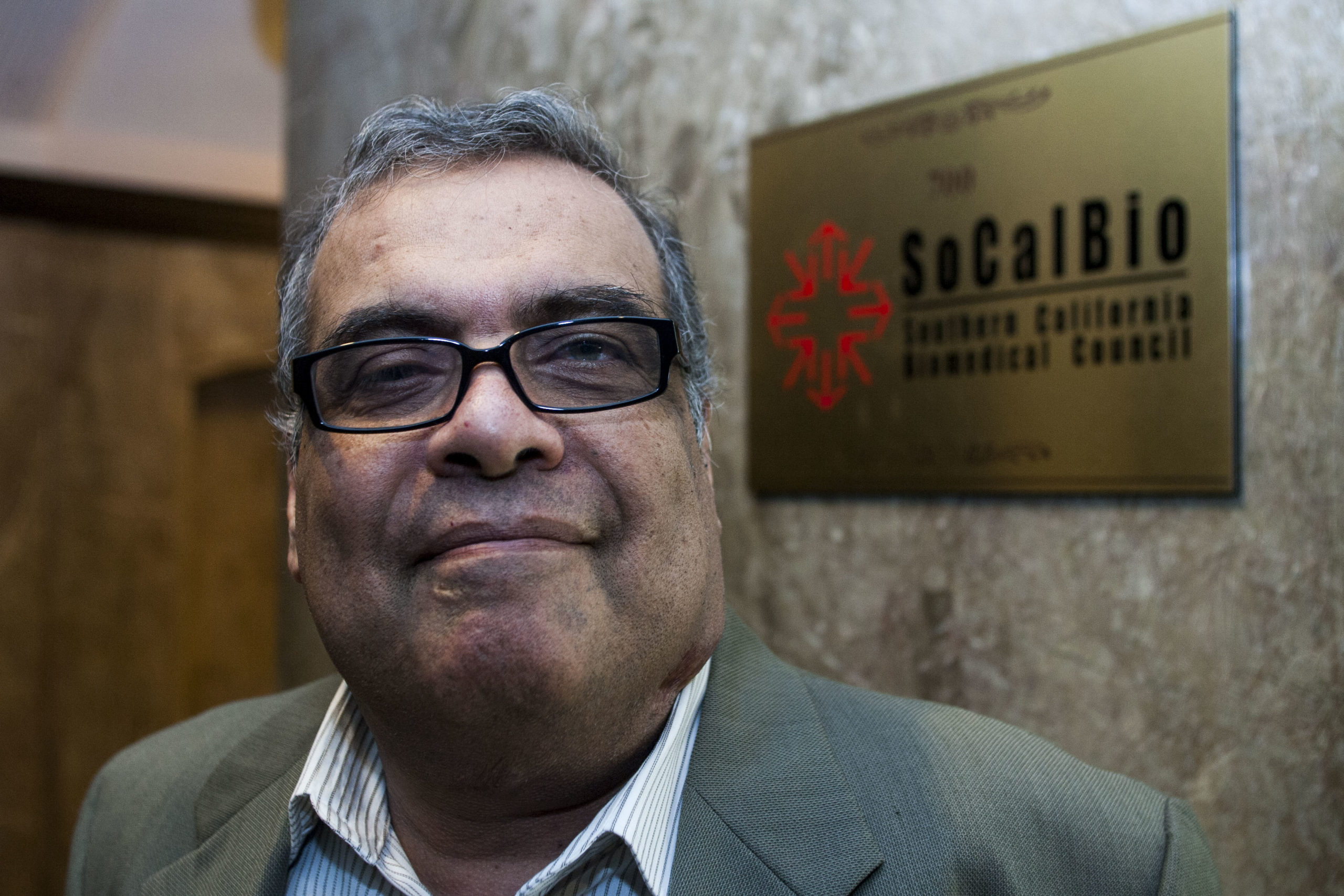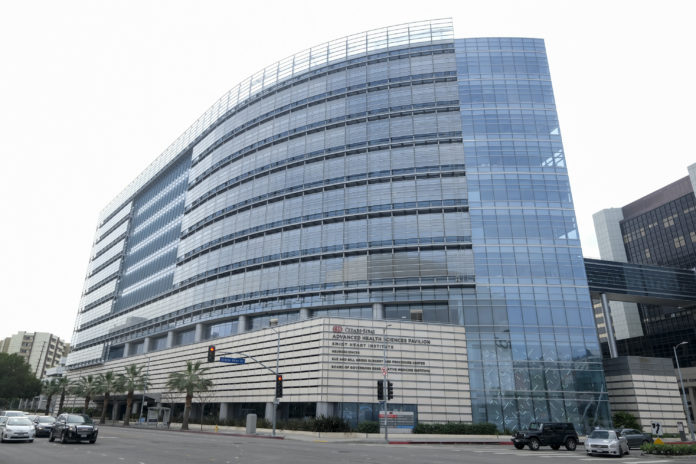As the coronavirus pandemic rages, many local biomedical and health care companies are rapidly turning their businesses toward fighting Covid-19.
Some of these companies have made their focus the immediate need for testing while others are working on a longer time frame with an eye toward potential treatments.
Then there are businesses that have changed gears to support the physical side of the battle, trying to develop protective gear and essential devices.

“For the most part, companies are taking existing projects they’ve been working on and are pivoting them toward coronavirus applications,” said Ahmed Enany, chief executive of the Southern California Biomedical Council, a downtown-based trade group that has been coordinating efforts among local biomedical companies to develop countermeasures against the coronavirus.
Enany said the pivots came about quickly.
“As Covid-19 continued to spread, people were initially weighing the options on whether to jump in, but things got very serious after the lockdowns started in mid-March,” he said.
Among the local companies that have taken up the challenge to develop, distribute and process rapid-testing kits are OmniPathology Solutions Medical Corp. of Pasadena, Fulgent Genetics Inc. of Temple City, Proactive Diagnostics Inc. of Thousand Oaks, DxTerity Diagnostics Inc. of Rancho Dominguez and MiraDX Inc. of West Los Angeles.
Other companies are using their technology to work up treatments for Covid-19. That includes a partnership between Westlake Village-based MannKind Corp. and West L.A.-based Immix Biopharma Inc. Another partnership has been formed by Culver City-based Immunity Bio Inc. and Redmond, Wash.-based tech giant Microsoft Corp.
Monrovia-based biopharmaceutical company Xencor Inc. has a licensing agreement with a Bay Area pharma company for an antibody treatment. Even local hospitals are getting involved: Cedars-Sinai Medical Center is participating in a clinical trial to evaluate a potential Covid-19 treatment.
Still other companies are aiming their technology at the protective gear health care workers require or at much-needed treatment devices. That group includes Panorama City-based NonLinear Ion Dynamics and a startup Los Angeles nonprofit called VentLife that launched in late March.
Testing priority
Most of the activity in L.A. has centered on development of rapid tests for Covid-19, driven in part by a Feb. 29 policy change from the Food & Drug Administration. That edict allowed more labs to develop and conduct tests than had previously been authorized and granted emergency approvals for new testing technologies.
The intent of the policy change was to prompt development of more rapid tests and to make it easier to mass produce them quickly. A shortage of test kits and the length of time to turn around results — typically several days or even a week — led to widespread calls for opening up the testing process.
Companies such as OmniPathology, Fulgent, Proactive Diagnostics and DxTerity have rushed to develop tests that can deliver results in hours, not days.
“This test will be available to our local community in Pasadena and Los Angeles with results available on the same day and up to 24 hours,” OmniPathology founder and Chief Executive Mohammad Kamal said in a March 24 announcement.
One L.A.-based company, BodySphere Inc., said it had received emergency authorization from the FDA for a two-minute Covid-19 test that it was preparing to distribute to health care providers.
Numerous media outlets picked up the story on March 31 although the company’s name did not appear on the California Secretary of State’s business registration portal.
On April 1, the FDA said it had not authorized the BodySphere test and reiterated its warning about companies selling fraudulent products related to Covid-19. Later that day, BodySphere pulled the announcement from its website.
The goal for these businesses is to deliver rapid-testing kits that are capable of detecting the novel coronavirus in hours, or even minutes, instead of the several days required by currently available tests.
Companies are also converting lab space to Covid-19 test analysis centers. On April 1, molecular genetics company MiraDX announced it had converted its genetics research lab to provide analysis of Covid-19 tests, relaying results to medical providers within 48 hours.
Treatment challenges
The biomedical council’s Enany said local companies are opting for the testing route because it’s easier, quicker and cheaper than trying to develop a treatment or vaccine. Much of the treatment and vaccine development is taking place in more established, larger and better-funded biotech centers in the Bay Area and San Diego, he said.
“A diagnostic platform is relatively easier to reconfigure to detect Covid-19 when the virus’ unique biomarkers are identified,” Enany said. “Pivoting to a therapeutic platform to target Covid-19 is comparatively difficult — you need to build the internal know-how, and it’s time-consuming and expensive. The overwhelming majority of local biotech companies is composed of small, narrowly focused and funding-strapped companies,” he said.
Nonetheless, some therapeutic work is taking place in Los Angeles County.
MannKind and Immix Biopharma are working to develop a powder therapy that can fight the pulmonary infection caused by the coronavirus. ImmunityBio, part of billionaire Patrick Soon-Shiong’s NantWorks family of companies, announced April 1 that it is collaborating with Microsoft to use the latter’s technology platform to perform a highly detailed analysis of the new coronavirus’ spike protein structure to help researchers around the globe develop treatments and a vaccine.
Xencor has licensed its technology to extend the half-life of new antibodies to San Francisco-based Vir Biotechnology Inc., which is developing antibodies to Covid-19.
And Cedars-Sinai is participating in a clinical trial to evaluate the experimental antiviral drug remdesivir, which has been developed by Foster City-based Gilead Sciences Inc.
Gearing up
Besides medical treatment, other companies are getting involved in the fight against the spread of the novel coronavirus and Covid-19.
Panorama City’s NonLinear Ion Dynamics, founded by former UCLA physics professor Alfred Wong, is converting plasma technology that was used 20 years ago to clean up hazardous waste and applying it to clean masks and protective gear used by health professionals.
And VentLife was founded just two weeks ago by UCLA engineering graduate and Biodesign Fellow Glen Meyerowitz and UCLA biodesign adviser Elliot Kotek to create a low-cost ventilator made from off-the-shelf parts that they hope can be mass-produced for $1,000 — a fraction of the $30,000-plus cost of a standard-issue ventilator.

